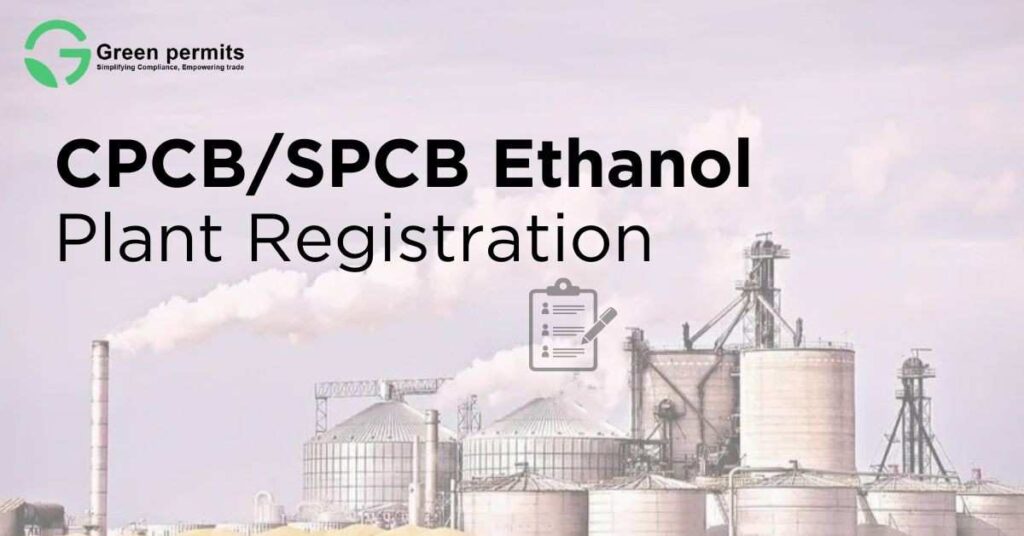India’s ethanol story is moving at record speed. With the government’s 20% ethanol blending target by 2025, businesses across sugar, grain, and chemical industries are racing to set up ethanol plants. But here’s the catch: no matter how promising the project, you cannot operate an ethanol plant in India without proper registration and clearances from the Central Pollution Control Board (CPCB) and State Pollution Control Boards (SPCBs).
This guide explains the step-by-step CPCB/SPCB ethanol plant registration process, the documents you need, applicable fees, timelines, and post-registration obligations. It’s written for business owners, compliance heads, and investors who want a clear roadmap — without the jargon.

| Metric | Latest Update | Source |
|---|---|---|
| Ethanol blending target | 20% by 2025 | MoPNG (2023) |
| Ethanol produced in 2023 | 600 crore litres (45% growth YoY) | MoFPI (2024) |
| Ethanol plants sanctioned | 600+ across India | PIB (2024) |
| Loans sanctioned for ethanol projects (2023–24) | ₹41,000 crore | Ministry of Finance |
| Savings from ethanol blending (2023) | ₹30,000+ crore in crude imports | MoPNG (2024) |
| CPCB registrations granted | 1,200+ in 2024 (35% YoY growth) | CPCB Annual Report |
Takeaway: Demand is surging, and regulators are tightening controls. Registration is not a formality — it’s your license to operate in India’s ethanol economy.
Before applying, businesses must understand the difference between the two regulators:
Takeaway: Think of CPCB as the policy-maker and SPCB as the execution authority. You need approvals from both.
Here’s the simplified roadmap for ethanol plant registration in India:
Takeaway: The process involves multiple layers, but a systematic approach can cut approval timelines significantly.
| Document Type | Mandatory | Optional |
|---|---|---|
| PAN, GST, CIN of the company | Yes | |
| Detailed Project Report (DPR) with capacity & feedstock | Yes | |
| CTE & CTO applications under Air/Water Acts | Yes | |
| Environmental Impact Assessment (if >60 KLPD) | Yes | |
| Authorization under Hazardous Waste Rules | Yes | |
| Process flow diagram of ethanol production | Yes | |
| Geo-tagged site photos & plant layout | Yes | |
| Import Export Code (if raw material is imported) | Yes | |
| Incorporation Certificate | Yes | |
| Aadhar of authorized signatory | Yes |
Takeaway: Incomplete or inconsistent documentation is the top reason for SPCB application rejection.
Registration and compliance fees vary depending on plant capacity and state regulations. Based on CPCB/SPCB models (similar to EPR & recycler fees), here’s a comparison:
| Capacity / Category | 2024 Fee (₹) | 2025 Fee (₹) | Validity |
|---|---|---|---|
| Small unit (<50 KLPD) | 2,500–10,000 | 5,000–12,000 | 5 years |
| Medium unit (50–100 KLPD) | 7,500–20,000 | 10,000–25,000 | 5 years |
| Large unit (>100 KLPD) | 1,50,000+ | 2,00,000+ | 5 years |
| Renewal fee | 50% of original | 50% of original | 5 years |
Note: Fees may also include Annual Maintenance Charges (AMC), usually around ₹5,000–10,000 per year.
Takeaway: Budget not just for one-time registration but also for recurring compliance costs.
Once registered, ethanol plants must maintain continuous compliance:
Penalties for Non-Compliance:
Takeaway: Compliance is not one-time — it’s an ongoing responsibility tied to business continuity.
A mid-sized ethanol producer in Haryana planned a 120 KLPD plant. Despite having financial sanction, their application was stuck for 6 months. The reason? The GST address on their certificate didn’t match the plant site address. SPCB flagged it and refused CTO.
How Green Permits Helped:
Outcome: The plant received CTO approval in 45 days after resubmission.
Lesson: Small compliance mismatches can delay multimillion-rupee projects. Expert support avoids costly setbacks.
Takeaway: Most delays are avoidable with proactive documentation and expert handling.
Takeaway: Green Permits is not just a consultant, but a partner in building your ethanol business responsibly.
Yes. SPCB grants CTE/CTO approvals, while CPCB oversees national-level compliance and EPR obligations.
CTE is needed before construction begins, while CTO is required before operations can start.
Typically 5 years, after which renewal is required.
Penalties include fines, suspension of operations, environmental compensation, and even legal action under the EPA Act, 1986.
Yes, but they must register with CPCB/SPCB and comply with FDI, DGFT, and MoEFCC guidelines.
Company PAN, GST, CIN, DPR, CTE/CTO, process flow, hazardous waste authorization, and site photos.
Ethanol is India’s growth fuel — but without CPCB/SPCB registration, your project is at risk of shutdowns, fines, and reputational damage. By following a structured compliance path, you secure both legal approvals and long-term sustainability.
Book a Free Consultation for Ethanol Plant Setup in India
Suggested Website Button Formats: